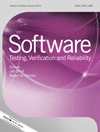
SOFTWARE TESTING VERIFICATION & RELIABILITY
metrics 2024
Pioneering Excellence in Software Assurance
Introduction
SOFTWARE TESTING VERIFICATION & RELIABILITY, published by Wiley, serves as a premier journal in the fields of software engineering, risk management, and quality assurance. With an ISSN of 0960-0833 and E-ISSN 1099-1689, this journal has been a pivotal resource since its inception in 1991, providing insights into the latest methodologies and technologies related to software testing and verification through to 2024. The journal is recognized for its rigorous peer-review process and boasts an impressive reputation, rated Q2 in Media Technology and Safety, Risk, Reliability and Quality, along with a Q3 rank in Software as of 2023. Its Scopus ranks further solidify its standing within the academic community, placing it in the 62nd and 43rd percentiles for Engineering and Computer Science, respectively. The journal fosters a collaborative environment for researchers, professionals, and students, encouraging the exploration of cutting-edge research, applications, and innovations in software testing and reliability, making it an invaluable asset for those seeking to advance their knowledge and expertise in this essential area.
Metrics 2024
 0.43
0.43 1.50
1.50 1.80
1.80 56
56Metrics History
Rank 2024
Scopus
IF (Web Of Science)
JCI (Web Of Science)
Quartile History
Similar Journals
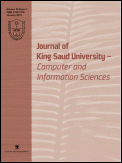
Journal of King Saud University-Computer and Information Sciences
Transforming Insights into Impactful SolutionsJournal of King Saud University-Computer and Information Sciences, published by ELSEVIER, is a prestigious open-access journal focusing on the rapidly evolving fields of computer science and information technology. Since its inception in 1996, this journal has provided a platform for high-quality research and innovative ideas, promoting the dissemination of knowledge to a global audience. With a remarkable impact factor and ranked Q1 in the Computer Science (miscellaneous) category as of 2023, it stands among the top 11% of journals in its field, reflecting its commitment to excellence and relevance. The journal proudly carries the ISSN 1319-1578 and E-ISSN 2213-1248, and it is based in Saudi Arabia while being part of a global academic network. With a Scopus rank of #26 out of 232 in general computer science, the Journal of King Saud University-Computer and Information Sciences is an essential resource for researchers, professionals, and students seeking to stay at the forefront of technological advancement. As it continues to thrive through 2024, it invites contributions that will shape the future of computing and information sciences.
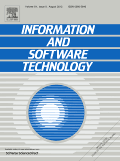
INFORMATION AND SOFTWARE TECHNOLOGY
Leading the Way in Software and Information Technology InsightsINFORMATION AND SOFTWARE TECHNOLOGY, published by Elsevier, is a leading journal that stands at the forefront of the fields of software engineering, information systems, and computer science applications. Since its inception in 1970 and with a focus extending to 2025, this esteemed publication has made significant contributions to the discourse on technological advancements and innovations. In 2023, it has achieved a remarkable Q1 categorization across multiple domains, including Computer Science Applications, Information Systems, and Software, reflecting its excellence and relevance in the academic community. With Scopus rankings that place it in the top percentiles in its categories (85th, 83rd, and 83rd respectively), the journal serves as an essential platform for researchers, professionals, and students eager to disseminate and engage with cutting-edge research and developments. While it does not currently offer Open Access options, the knowledge curated within its pages remains invaluable for advancing the fields of information technology and software development.
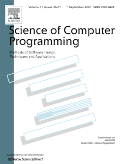
SCIENCE OF COMPUTER PROGRAMMING
Fostering Collaboration for a Dynamic Technological LandscapeScience of Computer Programming, published by Elsevier, is a leading journal dedicated to advancing knowledge in the fields of computer programming, computational theory, and software development. With a focus on interdisciplinary research that spans computational methodologies, information systems, and simulation modeling, this journal plays a vital role in disseminating innovative findings and fostering collaboration among experts in these dynamic areas. With a respectable impact factor and ranked in various Scopus Categories such as computational theory (Q3) and information systems (Q2), it provides a platform for high-quality scholarly articles that push the boundaries of programming science. Although currently not open access, the journal offers invaluable insights for researchers, professionals, and students alike, ensuring they are equipped with the latest advancements and methodologies to thrive in an ever-evolving technological landscape. The journal covers research from its convergence starting in 1981 and continues to welcome groundbreaking contributions as it looks forward to an exciting future through 2025 and beyond.
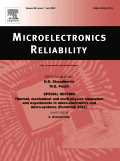
MICROELECTRONICS RELIABILITY
Connecting Research and Reliability in MicroelectronicsMICROELECTRONICS RELIABILITY, published by PERGAMON-ELSEVIER SCIENCE LTD, is a pivotal journal that serves the advancing field of microelectronics and materials reliability. With its ISSN 0026-2714 and E-ISSN 1872-941X, this journal has been at the forefront of disseminating research since its inception in 1962 and is set to continue exploring cutting-edge topics through 2024. The journal holds a respectable presence across several categories, achieving a Q3 ranking in areas such as Atomic and Molecular Physics and Electrical and Electronic Engineering, highlighting its broad interdisciplinary appeal, while also ranking in the Q2 category for Safety, Risk, Reliability, and Quality, which speaks to its commitment to ensuring standards in technological advancements. Access to this journal is subscription-based, making it an essential resource for researchers, professionals, and students seeking reliable information and data regarding electronic material performance and reliability assessment. Located in Kidlington, Oxford, UK, MICROELECTRONICS RELIABILITY is dedicated to advancing the field and addressing the critical issues associated with the reliability of microelectronic devices, thereby supporting innovations that shape our technological future.

Automated Software Engineering
Transforming Ideas into Automated SolutionsAutomated Software Engineering is a premier journal dedicated to advancing the field of software engineering through the exploration of innovative methodologies, tools, and applications. Published by Springer since its inception in 1994, this journal has established itself as a vital resource for researchers, industry professionals, and students alike, providing insights into the latest trends and technological advancements. With an impressive impact factor and currently ranked in the Q2 quartile of the Software category, it is recognized for its contribution to the discipline. The journal covers a broad scope of topics including automation in software development, empirical studies, and theoretical advancements, fostering discussions that bridge academia and industry. As we look forward to converging towards the year 2024, the journal continues to invite high-quality submissions that challenge existing paradigms and pave the way for future innovations in software engineering.
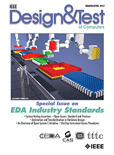
IEEE Design & Test
Exploring the Intersection of Hardware and Software ExcellenceIEEE Design & Test is a leading academic journal published by the IEEE-INST ELECTRICAL ELECTRONICS ENGINEERS INC, dedicated to advancing the fields of Electrical and Electronic Engineering, Hardware and Architecture, and Software. With an ISSN of 2168-2356 and an E-ISSN of 2168-2364, the journal spans from 2013 to 2024, offering valuable insights and peer-reviewed research that addresses critical challenges in the design, verification, and testing of electronic systems. Recognized for its quality, the journal holds a Q2 designation in Electrical and Electronic Engineering and ranks within the top quartiles of its category, making it a notable resource for professionals and scholars alike. Its Scopus rankings, particularly a rank of #354 in Electrical and Electronic Engineering, underscores its significance and relevance in the rapidly evolving technological landscape. Although not currently open access, the journal remains committed to disseminating innovative research that shapes the future of technology, ensuring that researchers and practitioners stay at the forefront of their disciplines. IEEE Design & Test serves as an essential platform for exchanging ideas, fostering collaboration, and driving advancements in engineering and computer science.

PROGRAMMING AND COMPUTER SOFTWARE
Fostering a Deeper Understanding of Software ComplexitiesPROGRAMMING AND COMPUTER SOFTWARE is a distinguished journal committed to advancing the field of software development and programming methodologies. Published by PLEIADES PUBLISHING INC, this journal has been a valuable resource since its inception in 1978, reaching out to researchers, professionals, and students alike. With an emphasis on rigorous peer-reviewed articles, the journal holds a Q3 ranking in the realm of Software according to the latest 2023 Category Quartiles. Though it does not offer open access, the journal ensures that high-quality research is disseminated to its audience, providing insights into evolving programming techniques, software engineering challenges, and innovative solutions. With its convergence of years extending to 2024, PROGRAMMING AND COMPUTER SOFTWARE remains a pivotal publication, fostering a deeper understanding of the complexities in computer programming while supporting the broader software community.

SOFTWARE QUALITY JOURNAL
Exploring the forefront of software quality metrics.SOFTWARE QUALITY JOURNAL, published by Springer, is a preeminent platform dedicated to advancing the field of software engineering and quality assurance. With an ISSN of 0963-9314 and an E-ISSN of 1573-1367, this journal serves as a vital resource for academics and practitioners alike, bridging the gap between theoretical frameworks and practical applications. The journal is recognized for its impactful contributions, holding a remarkable Q1 ranking in Media Technology and demonstrating strong performance with Q2 placements in Safety, Risk, Reliability and Quality, as well as Software, solidifying its reputation in the academic community. As of 2023, the journal is ranked 64th in Safety, Risk, Reliability and Quality and 176th in Computer Science Software on Scopus, showcasing its relevance and influence. Covering a broad range of topics from software quality metrics to risk management strategies, SOFTWARE QUALITY JOURNAL aims to foster innovation and best practices in software development. Join a community of leading researchers and professionals committed to enhancing the quality and reliability of software systems.
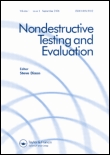
Nondestructive Testing and Evaluation
Transforming Engineering with Reliable Evaluation PracticesNondestructive Testing and Evaluation, published by Taylor & Francis Ltd, is a premier international journal dedicated to the dissemination of innovative research and practices in the field of nondestructive testing and evaluation. With a robust ISSN of 1058-9759 and an E-ISSN of 1477-2671, this journal has consistently served as a vital resource for researchers, professionals, and students interested in enhancing the safety and reliability of materials and structures through advanced testing techniques. The journal's significant impact, evidenced by its Q2 rankings across multiple categories—including Materials Science, Mechanical Engineering, and Physics and Astronomy, along with commendable Scopus rankings—reflects its commitment to high-quality scholarship. Covering the convergence of research from 1989 to 2024, Nondestructive Testing and Evaluation plays a crucial role in advancing methodologies that drive innovation in various engineering disciplines. While currently not offering an Open Access option, the journal remains a respected platform for exchanging knowledge that shapes the future of nondestructive methodologies.

RESEARCH IN NONDESTRUCTIVE EVALUATION
Championing the future of material safety and evaluation.RESEARCH IN NONDESTRUCTIVE EVALUATION, published by Taylor & Francis Inc, is a pivotal journal in the fields of engineering, physics, and materials science, dedicated to advancing the study and application of nondestructive evaluation (NDE) techniques. Since its inception in 1989, this journal has become a comprehensive platform for researchers and practitioners, promoting innovative methodologies that enhance material integrity and safety without inflicting damage. The journal currently holds a respectable Q3 ranking across several categories, including Condensed Matter Physics and Mechanical Engineering, placing it in the heart of academic discourse within these disciplines. With its publication metrics reflecting a keen interest in both theoretical and practical perspectives, RESEARCH IN NONDESTRUCTIVE EVALUATION serves as an invaluable resource for those committed to exploring the intricacies and future directions of NDE, contributing to sustainable development and quality assurance in various engineering applications. While it does not offer open access, the journal’s robust peer-review process ensures high-quality content that is instrumental for researchers, students, and industry professionals alike.